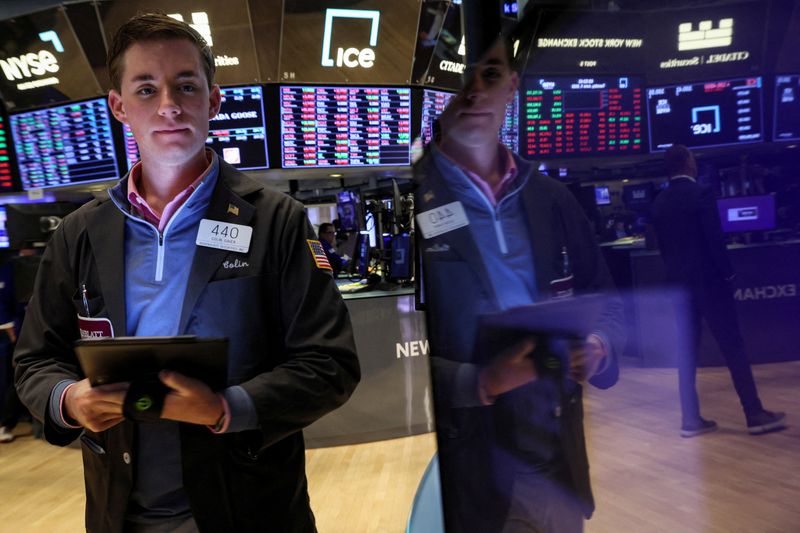By Geoffrey Smith
Investing.com -- The dollar finally corrected after charging higher for a month. Momentum faded overnight after Jerome Powell's latest hawkish comments failed to support it at short-term overbought levels. Europe's energy ministers meet for crisis talks in Brussels but aren't likely to agree on much. Stocks are set for their first positive weekly close in four weeks, after DocuSign (NASDAQ:DOCU) and Zscaler (NASDAQ:ZS) surprise positively with earnings. Kroger (NYSE:KR) reports later. And China's inflation eases under the strain of a weak economy, which is also weighing on global oil demand. Here's what you need to know in financial markets on Friday, 9th September.
1. Dollar correction
The dollar corrected finally, falling 1% after a barnstorming month-long rally in which market participants have had to ratchet their forecasts for U.S. interest rates ever higher.
Momentum reversed after the greenback failed to make new highs in response to (now-familiar) hawkish comments on Thursday from Federal Reserve Chair Jerome Powell, who told a Cato Institute event that: “We need to act now, forthrightly, strongly, as we have been doing and we need to keep at it until the job is done.”
The crosses were supported by the European Central Bank’s biggest rate hike in its 23-year life and the promise of more to come from its President, Christine Lagarde.
By 06:10 ET, the dollar index, which tracks a basket of advanced economy currencies against the greenback, was down over 1.1% at 108.48.
2. Europe’s energy ministers meet for crisis talks
Energy Ministers from around the European Union meet to thrash out measures designed to bring down cripplingly high power and natural gas prices ahead of the coming winter.
Hard decisions are unlikely, given differences between various member states on how best to reduce demand, and how to impose the proposed price cap on what remains of the bloc’s gas imports from Russia. EU Energy Commissioner Kadri Simson said ahead of the meeting that she expected progress toward a consensus but indicated that the plans may only be finalized at another meeting next week.
Wholesale market prices continued their decline, however, with benchmark Dutch TTF Natural Gas Futures falling 5.3% to 208.80 euros a megawatt-hour. Baseload power prices, meanwhile, have eased some 20% in the last week.
3. U.S. stocks set to open higher; Kroger earnings eyed
U.S. stock markets are set to end the week higher for the first time in four attempts, as sentiment strengthens after the pricing in of a higher U.S. rate trajectory.
By 06:30 ET (10:30 GMT), Dow Jones futures were up 231 points, or 0.7%, while S&P 500 futures were up 0.8% and Nasdaq 100 futures were up 1.1%.
Stocks to look out for later include DocuSign, which is marked sharply higher in premarket after finally posting an earnings update with improved guidance, while cybersecurity firm Zscaler is also higher after beating expectations late on Thursday. Smith & Wesson (NASDAQ:SWBI) is headed in the other direction after a disappointing report.
Kroger is the one big name due to report Friday.
4. China’s inflation eases further as economy slows
China continued to offer the world a respite from inflation. Its producer prices, which feed through (at least partially) into export prices with a certain time lag, rose only 2.3% on the year through August, their lowest reading in 18 months and well below analysts’ expectations.
Consumer prices inflation also eased, with prices falling 0.1% on the month to take the annual rate down to 2.5% from 2.7%.
Chinese stock indices rose by as much as 1.7%, while the yuan extended its rebound against the dollar, gaining 0.5% after bouncing off a big support level at 7 to the dollar on Thursday.
5. Crude bounces as dollar weakens
Crude oil prices bounced as the dollar weakened, taking the pressure off non-dollar-based importers around the world.
By 06:30 ET (10:30 GMT), U.S. crude futures were up 1.7% at $84.94 a barrel, while Brent crude was up 1.7% at $90.69 a barrel. Both contracts are still on course for their lowest close in seven months, however, with China’s Covid lockdowns again weighing on sentiment.
Consultancy Energy Aspects reckons that Chinese oil consumption could fall this year for the first time since 2002, by an average of 380,000 barrels a day. That’s partly because of the latest wave of outbreaks which will affect next week’s Golden Week holiday, a time when hundreds of millions of Chinese travel.
The Baker Hughes rig count and the CFTC’s positioning data round off the week later.
Is KR truely undervalued?
With KR making headlines, investors are asking: Is it truly valued fairly? InvestingPro's advanced AI algorithms have analyzed KR alongside thousands of other stocks to uncover hidden gems with massive upside. And guess what? KR wasn't at the top of the list.
Unlock ProPicks AI